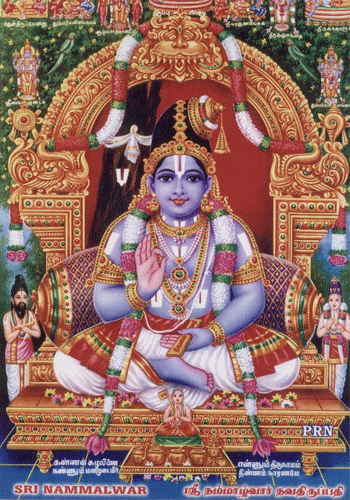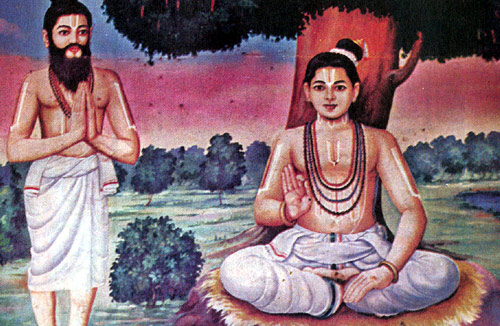Published from “Three Minutes” series written by A.S.Rajagopalan Swami of Ohio.
 minnin nilai ila
minnin nilai ila
man uyir AkkaigaL
ennumiDattu iRai
unnumin nIrE
(nammAzhvAr, tiruvAimozhi 1-2-2)
AkkaigaL = the body (sarIram)
man = (of) earthly
uyir = living things
ila = is not (even equal to that)
nilai = (state or) life of
minnin = a lightening
ennumiDattu = If so,
nIrE = You all,
unnumin = meditate deeply (on the)
iRai = Lord who is the protector
svAmi nammAzhvAr is called vEdam tamizh seyda mARan (mARan who did the veda-s in tamizh) because he gave the four vast and complex veda-s in four short and sweet tamizh prabandham-s. Among them the final hymn (carama prabandham) is tiruvAimozhi which is regarded as the essence of sAma veda. In this particular verse, nammAzhvAr is preaching (upadesham) to take the refuge at the Lord’s lotus feet immediately. He makes it lucid by giving a comparison of lightning (minnal) to the lives of all sentient (cetana).
VisiShTa advaitam (qualified nondualism), the shrIvaiShNava school of philosophy as propagated by svAmi rAmAnuja, is based on three distinct realities: (tattva trayam) – sentient (cetana or jIvAtmA), non sentient or matter (acetana or prakR^iti), and Lord (Ishvara or paramAtmA). First, we must understand that the individual souls are different from the temporary body where they reside in. The body is a matter like a piece of wood. The soul (AtmA) enters the body at birth and leaves at death, yet it remains unchanged before and after it enters the body.
Lord KR^iShNa, in bhagavat gItA, says that a soul never dies, but the body does. The soul wears bodies like a person wears clothes, getting into a new dress and discarding the old ones. The dress that the soul wears next depends on the wardrobe, which in turn, depends on what is already bought and stored based on the soul’s affordability and taste.
The law of accumulated reaction to activities (karma) dictates the path of the souls. The type of body and the quality of life is determined on the accumulated pious deeds (puNya) and sinful actions (pApa). That is the generalization of the perpetual birth/death cycle (samsAra). For bacteria, the life is in terms of minutes, for human beings, it is around 100 years. One can’t evenimagine the number of lives one might have had since the dawn of the universe, let alone the universe itself being created and destroyed infinitely.
Karma is generated only in human life and so, humans need to lead life responsibly. They should be able to distinguish between temporary items (anitya vastu) and permanent values(nitya vastu). Due to this illusion (mAyA, bhramai), the soul becomes deeply attached to the body and mistakenly identifies itself as the body. Because of this erroneous identity (sarIra Atma bhramam), the soul is clouded with the body’s pleasures. In that process, the soul gets entangled with various vices causing it to commit more sins and thus, entraps itself into further bondage.
Here, AzhvAr hints that our life is just a speck in the total time spectrum. Lightning is so bright, powerful, and jolting. But, how long is its life? Our life span is also similarly tiny. As Kulashekhara AzhvAr put it, our mere presence in this earth is sufficient proof that in the last birth (janma) we didn’t recite Lord’s name (Bhagavat nAmA). Think for a moment, that you are reading this now because of your wardrobe (karma) and taste (spiritual interest).
nammAzhvAr says, while you still have that conscious mind, make use of your current human life! Meditate deeply and take refuge at the lotus feet of shrIman nArAyaNa. In the case of lightning, you know its lifespan, but no one knows about the length of our stay on this earth.
In summary,
1. Body and soul are different. Body is engaged with sensuous pleasures, while the soul craves for the service to the Lord.
2. Life is too short to be wasted on useless things. Hold on to the Lord’s feet, immediately.
3. Cultivate the spiritual mindset. One may try to postpone the meditation on the Lord, but there is no guarantee of life or mindset afterwards.
4. Discriminative knowledge on permanent and temporary pleasures is essential (nitya anitya vastu vivekam). Concentrate on eternal happiness (mukti) rather than temporary pleasure (bhukti).
Catch, then, oh catch the transient hour; Improve each moment as it flies; Life’s a short summer, man a flower; He dies – alas how soon he dies.









